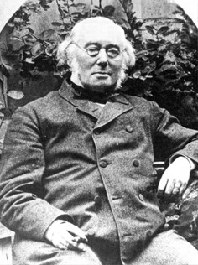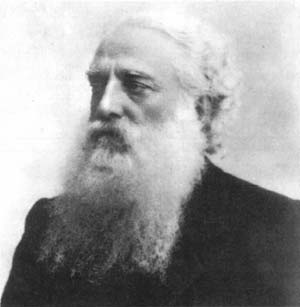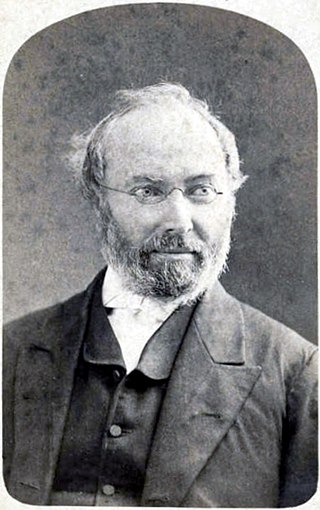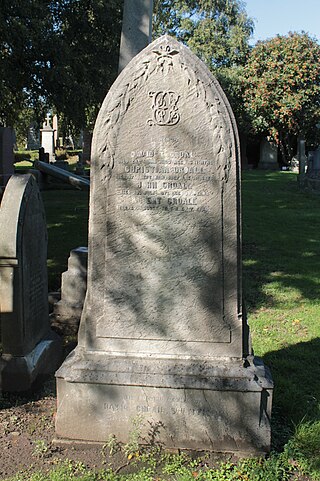Related Research Articles

Christian theosophy, also known as Boehmian theosophy and theosophy, refers to a range of positions within Christianity that focus on the attainment of direct, unmediated knowledge of the nature of divinity and the origin and purpose of the universe. They have been characterized as mystical philosophies. Theosophy is considered part of Western esotericism, which believes that hidden knowledge or wisdom from the ancient past offers a path to illumination and salvation.

Eduard Gottlob Zeller was a German philosopher and Protestant theologian of the Tübingen School of theology. He was well known for his writings on Ancient Greek philosophy, especially Pre-Socratic Philosophy, and most of all for his celebrated, multi-volume historical treatise The Philosophy of Greeks in their Historical Development (1844–52). Zeller was also a central figure in the revival of neo-Kantianism.

Philip Schaff was a Swiss-born, German-educated Protestant theologian and ecclesiastical historian, who spent most of his adult life living and teaching in the United States.

Friedrich Daniel Ernst Schleiermacher was a German Reformed theologian, philosopher, and biblical scholar known for his attempt to reconcile the criticisms of the Enlightenment with traditional Protestant Christianity. He also became influential in the evolution of higher criticism, and his work forms part of the foundation of the modern field of hermeneutics. Because of his profound effect on subsequent Christian thought, he is often called the "Father of Modern Liberal Theology" and is considered an early leader in liberal Christianity. The neo-orthodoxy movement of the twentieth century, typically seen to be spearheaded by Karl Barth, was in many ways an attempt to challenge his influence. As a philosopher he was a leader of German Romanticism.

Albrecht Benjamin Ritschl was a German Protestant theologian.

Colonel Henry Steel Olcott was an American military officer, journalist, lawyer, Freemason and the co-founder and first president of the Theosophical Society.

John Frederick Denison Maurice was an English Anglican theologian, a prolific author, and one of the founders of Christian socialism. Since the Second World War, interest in Maurice has expanded.
George Foot Moore was an American historian of religion, author, professor, and Presbyterian minister.
Liberal Christianity, also known as liberal theology and historically as Christian Modernism, is a movement that interprets Christian teaching by taking into consideration modern knowledge, science and ethics. It emphasizes the importance of reason and experience over doctrinal authority. Liberal Christians view their theology as an alternative to both atheistic rationalism and theologies based on traditional interpretations of external authority, such as the Bible or sacred tradition.

Johannes Christian Konrad von Hofmann was a Lutheran professor of systematic and historical theology.

Phoebe Palmer was a Methodist evangelist and writer who promoted the doctrine of Christian perfection. She is considered one of the founders of the Holiness movement within Methodist Christianity.
Henry Preserved Smith was an American biblical scholar.
Characteristic of Christianity in the 19th century were evangelical revivals in some largely Protestant countries and later the effects of modern biblical scholarship on the churches. Liberal or modernist theology was one consequence of this. In Europe, the Roman Catholic Church strongly opposed liberalism and culture wars launched in Germany, Italy, Belgium and France. It strongly emphasized personal piety. In Europe there was a general move away from religious observance and belief in Christian teachings and a move towards secularism. In Protestantism, pietistic revivals were common.

David Friedrich Strauss was a German liberal Protestant theologian and writer, who influenced Christian Europe with his portrayal of the "historical Jesus", whose divine nature he denied. His work was connected to the Tübingen School, which revolutionized study of the New Testament, early Christianity, and ancient religions. Strauss was a pioneer in the historical investigation of Jesus.
The history of New Thought started in the 1830s, with roots in the United States and England. As a spiritual movement with roots in metaphysical beliefs, New Thought has helped guide a variety of social changes throughout the 19th, 20th, and into the 21st centuries. Psychologist and philosopher William James labelled New Thought "the religion of healthy-mindedness" in his study on religion and science, The Varieties of Religious Experience.

Schubert Miles Ogden was an American Protestant theologian who proposed an interpretation of the Christian faith that he believes is both appropriate to the earliest apostolic witness found in the New Testament and also credible in the light of common human experience. He has written eleven books and been awarded many honors including the John Simon Guggenheim Fellowship, a Fulbright research scholarship, as well as honorary degrees from Ohio Wesleyan University, the University of Chicago, and Southern Methodist University. He has been invited to many titled lectureships in universities in Europe and the United States, made President of the American Academy of Religion (1976-7), and elected a Fellow of the American Academy of Arts and Sciences (1985).

Thomas OsmondSummers was an English-born American Methodist theologian, clergyman, hymnist, editor, liturgist and university professor. He is considered one of the most prominent Methodist theologians of the nineteenth century.

The Croall Lectures are a lecture series in Christian theology given in Edinburgh, and founded in 1876. The Lectures were endowed by John Croall of Southfield, who died in 1871.
The Reformed systematic theology bibliography lists complete works of systematic theology in the Reformed tradition. Systematic theology is the orderly formulation of Christian doctrines and beliefs. This bibliography includes works which attempt to present a coherent account of all major doctrines of the Reformed faith. Theologians considered by scholars to be in the Reformed tradition are included, even if they are considered to have departed from any particular conception of the Reformed faith.
References
- ↑ Kelsey, Catherine L. Methodism in America (1840-1884): Intellectual Engagement with Schleiermacher, but No Embrace. In Jeffrey A. Wilcox, Terrence N. Tice, Catherine L. Kelsey. (2013). Schleiermacher's Influences on American Thought and Religious Life, 1835-1920: Volume One. Pickwick Publications. p. 83. ISBN 978-1-60608-005-4
- ↑ "Henry C. Sheldon (1871)". Boston University School of Theology.
- ↑ Burr, Nelson Rollin. (2015 edition). Critical Bibliography of Religion in America, Volume IV, Parts 1 and 2. Princeton University Press. p. 344. ISBN 978-0691625744
- ↑ "Henry Clay Sheldon". Find a Grave.